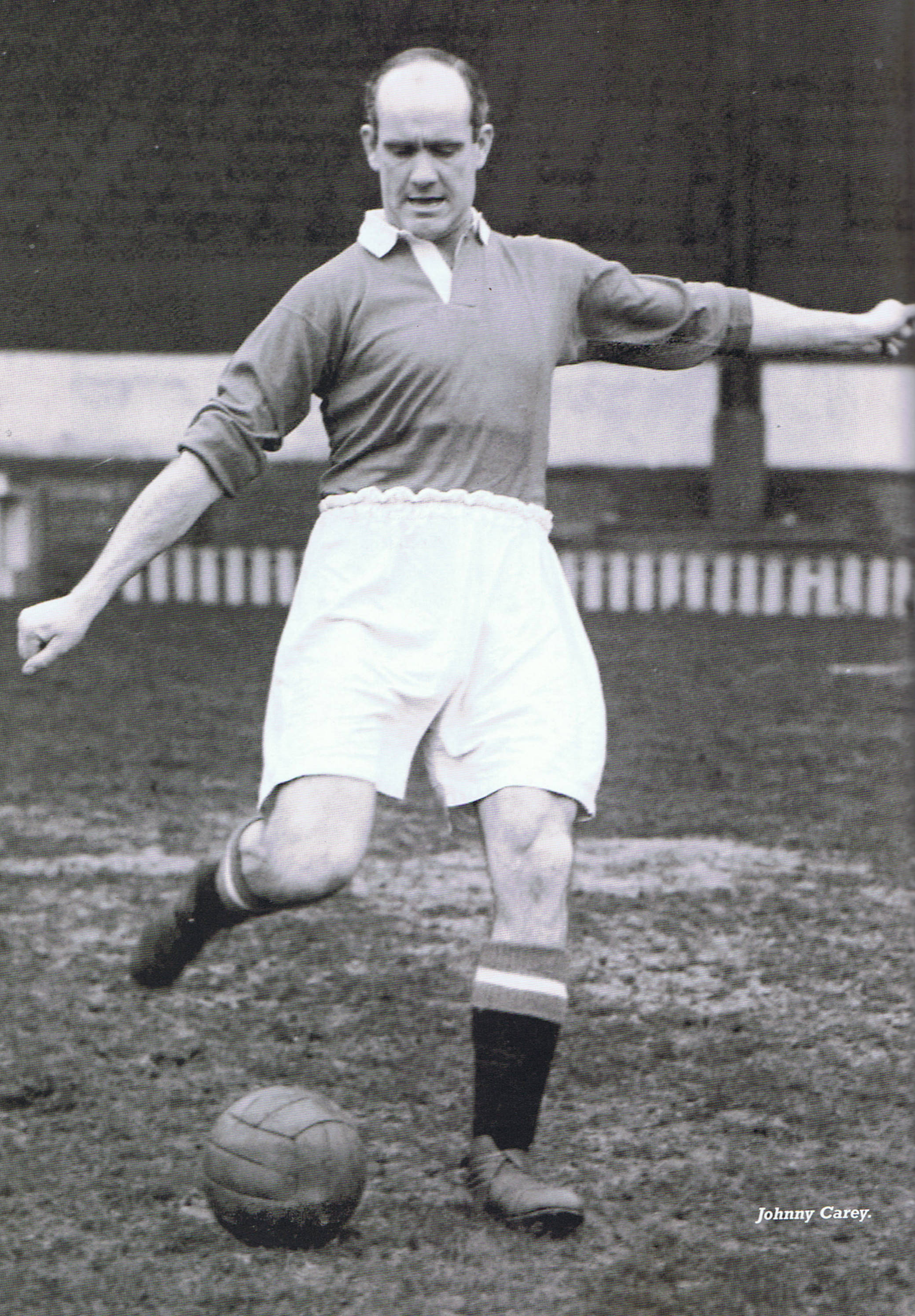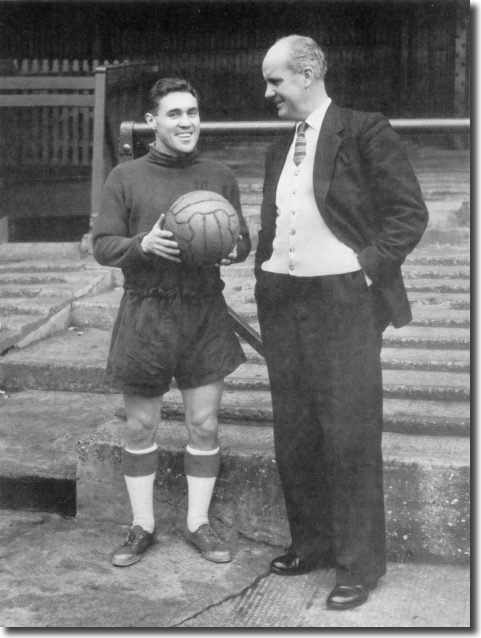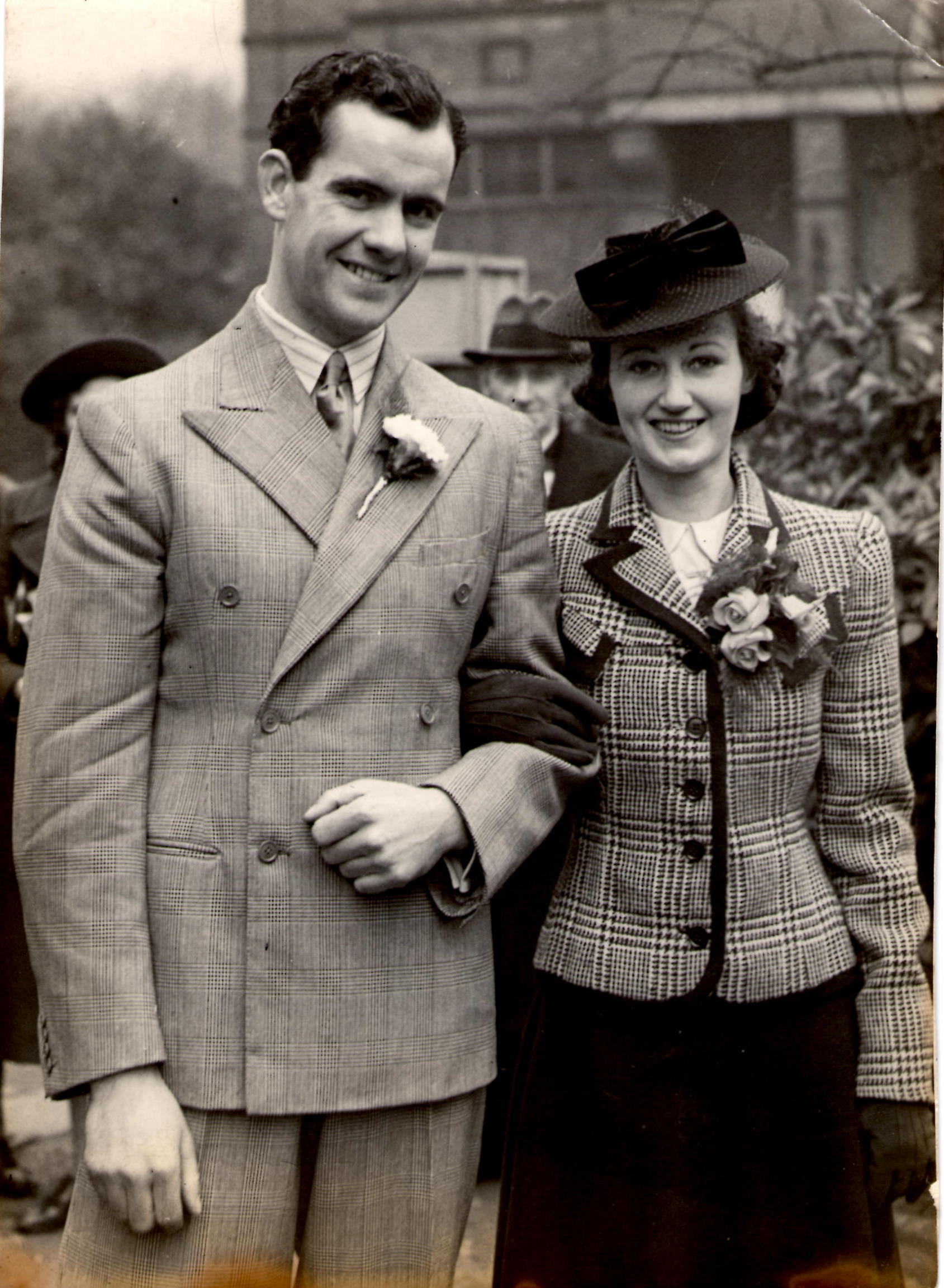He wore the Royal Blue of Everton as a player, cut his managerial teeth at Blackburn Rovers and went on to develop a team that would go on to win championship honours but he wasn’t Howard Kendall...he was “Gentleman” Johnny Carey.
If you know your history, mention of his name triggers the refrain “Taxi!” – a saying coined from Carey’s infamous dismissal as Everton manager in a London cab in 1961 and still shouted at football managers over 50 years later. However, to remember Carey only for this incident would do a huge disservice to a man still regarded as an icon in his native Ireland and amongst Manchester United supporters.
Johnny Carey (variously known to colleagues as Johnny, Jack and Jackie) passed away in 1995 but I recently caught up with his son Mike and reflected on a remarkable life.
Carey was born in Dublin in 1919 and joined Manchester United in 1936. Having broken into the team in 1937, his career, like that of Everton’s Mercer and Lawton, was interrupted by war. As was customary during wartime, Carey made guest appearances for numerous teams including Everton.

Despite being “neutral” as an Irishman, Johnny decided to fight for the allied forces:
”His mother really wanted him to return to Ireland, but
he had met the woman who he was to marry – my mother, Margaret. Dad
felt that as he lived in England and was paid by United, he should
join the army. After they married, he was posted to Italy and Egypt. I was born a few months later and did not see my father until he returned from the war and I was 4 years old. Apparently I was not too happy about this
strange man coming into our settled life!”
Once hostilities ceased, Carey returned to a war-ravaged Manchester
(United had to play at Maine Road for a period due to bomb damage at Old Trafford) and was appointed team captain by Matt Busby. Carey was a classy, versatile player who eventually settled into a full-back berth.
“He played in every position for United apart from outside left
(as it was known as in those days). He even played in goal once: substitutes were not allowed and the goalkeeper developed a tummy problem on the coach down to Arsenal I think; they drew 1-1.
“To be honest, I really do not recall seeing my father play for United. Youngsters of my age tended not to go as much as they do today. The only time I actually remember him playing was when he was managing Everton. I think it was in a charity match with Liverpool and Everton staff versus a show business team. What struck me was that he always seemed to be in space when he received the ball – obviously a good reader of the game.”
Carey represented both the Northern Irish and Eire teams during the post-war period and starred in an historic 1949 2-0 victory over England at Goodison – the first by an overseas team on British soil (check YouTube for some excellent Pathe footage).
Having captained United to FA Cup glory in 1948, Carey went on to be named “Footballer of the Year” in 1949. After leading United to the 1st Division Championship in 1951-52, he hung up his boots in 1953 after 304 appearances. However, he had already been thinking towards a career in management:
”I think he always liked the challenge of management and always
intended to follow that direction. As a boy, I went to St Bede's College in Manchester, as a boarder, and I recall that dad regularly coached the first team there.”
Soon Blackburn Rovers, then in the second tier of the league pyramid,
came calling and Johnny set to work on overhauling the squad and
instilling his values:
“He liked fast, open football played with skilful players – very similar philosophies to his mentor Matt Busby. He would have been a very good motivator, in his own special way.
“I recall him saying that he had the immediate respect of the Blackburn
players when he joined the club as manager. Although he had retired,
he reckoned he would actually have been their best player!
“Rovers had an ageing team and he implemented a new youth policy, similar to United's. Over the 4 or 5 years that he was there, he brought along so
many terrific players – in fact the regular first team all became
internationals and Ronny Clayton was England's captain. This was obviously noticed by Everton.”
Sure enough, Everton had taken notice…
The 1950s had been a disappointing period for the Blues with a rare relegation into the Second Division. Former player Cliff Britton walked away after a power struggle with the Board in 1956 and Ian Buchan was his surprise replacement. In fact, Buchan only held the position of Chief Coach, with the Board having a large say in team affairs. A poor start to the 1958-59 season saw things reach breaking point and Buchan was stripped of even more of his powers.
Everton Chairman Dick Searle made approaches to Rovers in early September 1958 and Carey was confirmed in the post on 22 September. As a man of honour, Carey worked his 4-week notice at Ewood Park before heading for the underachieving School of Science.
“I know he was really made up to be at Everton – The Big Time! It is a
fabulous club and Dad was very proud to be its manager. I went to Goodison a few times but, as you can imagine, Dad had to be there well before kick-off and my mum was not really a very good WAG and tended to do other things on match days. However, I do recall the amazing atmosphere and the sheer size of the ground. I think you actually took a lift to the management offices. Very impressive!”
The Everton minute books reveal that, in contrast to Buchan, Johnny was given relative freedom to appoint staff and players and manage team affairs – with the caveat of the Board having over-arching responsibility.
The club purchased accomodation at 342 Liverpool Road, Birkdale for £3,650 and rented it to the manager for £1 per week. The salary was set at £3,000 per annum.
“Living in Birkdale was great. By then, I was working at an Advertising
Agency in Manchester so I travelled to work every day on the train
from Southport to Victoria. Dad was a member of the golf club and
played off 4. My brother and two sisters all lived there, whilst I commuted to Manchester by train each day. Funnily, despite living at the seaside, we never went to the beach! Most Sundays, we would have lunch at the Bold Hotel. Happy days...”
On his arrival on Merseyside, Carey was quoted as saying that he wanted to give Everton “entertaining and, if possible, winning football” and his mantra was “only the goalkeeper stops the ball”.
Shortly before his appointment, the Board had conducted the signing of Bobby Collins – one of Everton’s greatest leaders on the pitch.

”Dad obviously needed the freedom to build the team in his own way. I do
recall Young and Vernon, both superb players, and Bobby Collins – Wow! ... Paul Scholes springs to mind. I remember playing in a practice match at Bellefield and a few first-team players were involved. The massive difference was not the strength or fitness of the more senior players, but the speed of thought.”
Collins spoke later of the Carey and his predecessor:
“Ian Buchan knew the game but he was too much of a theorist, having never played the game at the top level. Johnny on the other hand had a wealth of experience and understood players more as he had been successful in his own playing career. A great tactician, he gave you a job and it was down to the player to make it work.”
Once in office, Carey made some fine signings – notably Roy Vernon from Blackburn, left-winger Tommy Ring, and right-winger (and future manager) Billy Bingham. He steadied the ship and led the side to a 16th-place finish followed by a 15th-place finish in 1959-60. The team were hailed for their attacking football but a propensity to leak goals – especially away from Goodison – was costing the team dearly.
John Moores, the Littlewoods magnate, became Chairman in June 1960 and set about ensuring that the Blues challenged for honours without delay.
There was a perception in some quarters that Carey too much of a “gentleman” to wring the best of the squad – something that Bobby Collins alluded to in an interview:
“Johnny insisted that we enjoyed our football. The only flaw he had was that he wasn't hard enough with the players and some did take liberties. Discipline was not tight enough and this stopped him from becoming a great manager. Top managers need a ruthless streak, as players do, if they want to make it at the highest level”
I put this to Mike Carey:
“You really cannot be a successful footballer unless you have a degree of hardness… I think he was always described as hard but fair. At the end of the day, you have a job to do, or you fail. He was always described as a very intelligent player and would do his homework on the opposing teams and individual players.”
The 1960-61 season had seen the team in inconsistent form with a mix of stirring wins and disappointing defeats. Gossip on Merseyside suggested that Harry Catterick was being lined up for the Goodison hot-seat following his resignation at Sheffield Wednesday
And so it was that on the evening of Friday, 14 April 1961, Carey and
Moores found themselves together in a London taxi. James Corbett described it thus in his excellent book “Everton – The School of Science”:
“On Friday 14 April 1961, Carey and Moores travelled to London for an FA meeting. Even though Everton had beaten Newcastle United 4-0 at St James's Park the previous Saturday, speculation was more intense than ever about Carey's future. Wanting clarification, he demanded a meeting with his chairman. Moores suggested that they reconvene and the two men took a taxi to the Grosvenor House Hotel. During that journey, Carey repeated his request for clarification on his future. Moores, always a man of principle, went straight to the point. He told Carey that he was being replaced."
“It was a great shock at the time and he did not see it coming. I
guess he was not too happy and his pride would have been damaged, as
the team was actually doing well. To be fair to Mr Moores, it must have been very difficult for anyone who has run a big company to simply leave matters with a manager. After all, everyone who supports the club will have strong views about all the players and almost anyone can pick a team. I think he just wanted to have his own man to run things in his own way.”
It was a measure of the man that Carey led the team to a 5-1 victory against Cardiff the following day before officially stepping down. Alex Young, a November signing from Hearts, hit injury-free top-form just too late to save his manager.
By the following Monday, Moores was chairing a board meeting at which
Harry Catterick was present and confirmed as the new manager – this seemed to confirm the speculation that Catterick had been tapped up prior to Carey’s dismissal. After victories in the final two games of the season, Everton finished 5th in the table.
Who can say how things would have panned out had Moores stuck with Carey – maybe the team would have clicked with Vernon and Young supplying the goals and the likes of Gabriel, Labone and Temple becoming established in the team. Moores would ultimately be vindicated as the team, with additions such as Morrissey and West, lifted the 1962-63 title trophy. Catterick was more pragmatic than Carey – willing to sacrifice some flair in search of victories and silverware.
“I really cannot say whether Dad would have been bitter. I don't think
that was really his style and he was always quite diplomatic. He was
very proud of his achievements at Goodison during the short period
that he was in charge. I know he had many letters of support at the time. Over the years we always looked for the United, Blackburn and
Everton results first.”
Did it rankle that his sacking in a cab had gone down in football folklore?
“I’m not sure. He was quite a proud man, but he did have a terrific
sense of humour and would not hold a grudge.”
The Board minutes reveal that a legal dispute arose over unpaid wages following Carey’s dismissal; .a pay-off of approximately £4,000 was agreed on in February 1962 – instead of the £12,970 sought by Carey.
“I understand that the club refused to pay what was owed to my father on his contract and that he had no alternative other that to
instigate legal action. The case was settled after a year or so, on
the steps of the court”
Not one to rest on his laurels, Carey took the reigns at unfashionable Leyton Orient in East London.
“While waiting for the case against Everton to be settled, I understand that he was advised that it was a legal requirement to seek alternative employment. He had a few good offers, but decided to join Leyton Orient in the Second Division. Amazingly, considering the finances and general resources of the club, he got them promoted to Division 1 in the first year. He really enjoyed his time in the East End. I stayed up here in Southport in order to work in Manchester but my brother and two sisters went to live in Woodford Green.”
Carey’s reputation was enhanced further during a spell at, Second Division; Nottingham Forest with a 1967 FA Cup semi-final appearance and a second place finish in the First Division 4 points behind Manchester United. Did any further offers to manage any of the top First Division teams come along?
”Not as far as I know. Forest did very well during his time there and is still remembered; when we visited my daughter in Nottingham recently the Hilton Hotel concierge was an avid Forest fan and knew all about Dad.”
 Carey’s wife, Margaret (who passed away recently) had to cope with the frequent relocations that being the wife of a football man involved:
Carey’s wife, Margaret (who passed away recently) had to cope with the frequent relocations that being the wife of a football man involved:
“My mother was great. She took everything in her stride. They had a
wonderful marriage. I really do not recall them ever having an argument. When they needed to move house, mum tended to get on with it and make all the decisions. I remember dad saying that he made all the big decisions, such as whether the Americans should get out of Vietnam, leaving mum to make the smaller ones, such as where they lived, choice of schools, holidays etc.”
After a couple more seasons back at Blackburn, Carey retired from football management in 1971. Aside from some scouting work for United, he ended up working for Trafford Council:
”It was quite a change, but he became Chief Clerk to the Treasurer's
Dept; it sounds very important, but I guess not really. He was a very private person, but I know he enjoyed his weekends playing golf at Bramhall Park Golf Club. He was also able to visit my brother's family in Australia a couple of times, which would have been difficult during his management days.”
“When Dad passed away in 1995 Sir Alex Ferguson and a couple of United players came to the funeral, which was nice. The Chairman of United at the time, Martin Edwards, agreed to let Dad's ashes be scattered in the goalmouth at the Stretford End as per my mother's wishes.”
Most of Carey’s mementos are in the Legends Section at the Manchester United Museum. These include an FA Cup medal, international caps, Footballer of the Year Trophy, FIFA shirt when he captained the Rest of the World team against a Great Britain Team. (“He said it was really funny, as he was the only player in the team that spoke English and he was Irish!”)
Mike himself played youth football for Blackburn Rovers with the likes of Mike England, but settled on a career in advertising. Now based in Salford, he is a self-confessed Mancunian “Red” but retains very fond memories of the family's involvement with Everton and Blackburn Rovers.
”I always enjoy watching Everton on TV, particularly when they do well
against City!”
So next time you hear the cries of “Taxi” directed at a beleaguered football manager – remember the remarkable man behind it.
Prepared for ToffeeWeb by Rob Sawyer